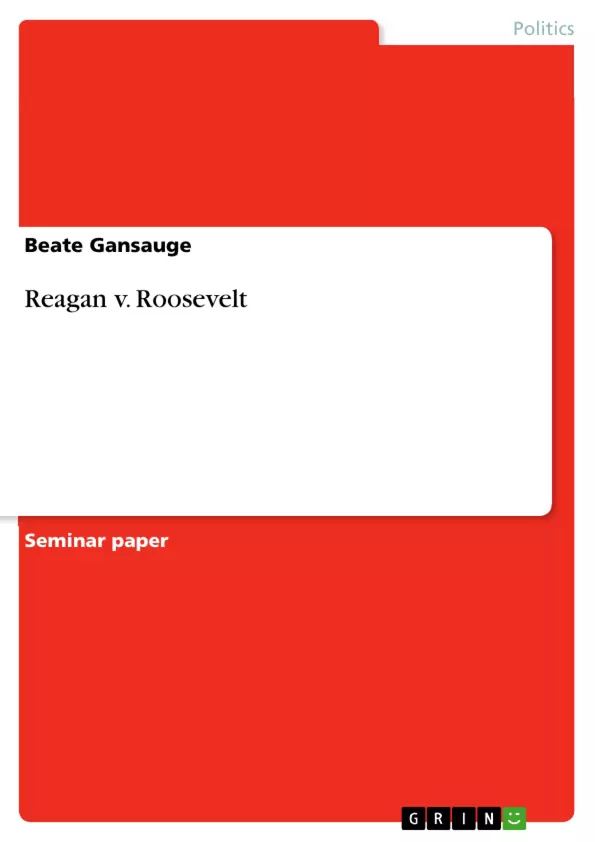In this paper I argue that the anti social liberalism critique of the 1980s did not live up to its strong rhetoric. This is due to a number of reasons. First and foremost, during Reagan’s presidency the Democratic majority in Congress had the power to block any means going beyond their accepted limits. Second, Reagan and his fellow Republicans knew very well that Americans had become very attached to certain aspects of the post-New Deal welfare state, especially health care and unemployment benefits. Other aspects, such as the support of labor unions, had a weaker standing in the general population and thus were more open for debate. Reagan pushed for deregulation to solve a situation that was in some aspects similar to that of the 1930s – the economy was stagnating, unemployment rose, inflation was threateningly high. Yet, in other ways the 1980s were, of course, completely different. The middle class had gotten used to an ever increasing living standard in the previous four decades. New technologies had become widely available, economic ills had been almost absent for a vast number of white working and middle class people for the longest period ever in the history of the United States. The fear of economic deprivation was rooted deeply in the American people, yet America was far from the desparation of the Great Depression. When Reagan promised a “morning in America” many voters gladly turned to this cheerful, persuasive former Hollywood actor. It also helped that Reagan predecessor Carter did not seem to have any means to stop the recession and that independent candidate John Anderson split the vote in the 1980 election.
Table of Contents
- Introduction
- Roosevelt's New Deal and the Resulting Policy Shift
- Reagan's Critique of Social Liberalism
Objectives and Key Themes
This paper examines the anti-social liberalism critique of the 1980s, arguing that it fell short of its strong rhetoric. The author analyzes the reasons behind this failure, focusing on the political and economic landscape of the time.
- The role of the Democratic majority in Congress in shaping policy during Reagan's presidency
- The enduring public support for certain elements of the post-New Deal welfare state
- The impact of Reagan's deregulation policies on the economy and social well-being
- The similarities and differences between the economic challenges of the 1930s and the 1980s
- The evolution of social liberalism in response to economic changes and political pressures
Chapter Summaries
Introduction: This chapter provides an overview of the paper's argument and outlines the key factors that contributed to the limited impact of the anti-social liberalism critique during the Reagan era.
Roosevelt's New Deal and the Resulting Policy Shift: This chapter explores the role of government intervention in the American economy during the Great Depression, focusing on President Franklin D. Roosevelt's New Deal policies. The chapter analyzes Roosevelt's arguments for government intervention and its impact on the economy, including the establishment of minimum wages, shorter work weeks, and social security.
Reagan's Critique of Social Liberalism: This chapter examines the core principles of Reagan's critique of social liberalism, including his belief that government is the problem, the need for deregulation, and the dangers of excessive government spending. The chapter analyzes Reagan's arguments and their impact on economic policy during his presidency.
Keywords
This paper focuses on the themes of social liberalism, anti-social liberalism, government intervention, economic regulation, deregulation, welfare state, economic crisis, the New Deal, Reaganomics, and the role of government in society. It explores the contrasting approaches of Presidents Franklin D. Roosevelt and Ronald Reagan to addressing economic challenges and the evolving political landscape of the United States in the 20th century.
Frequently Asked Questions
How did Reagan's policies differ from Roosevelt's New Deal?
Roosevelt focused on government intervention and social safety nets to combat the Depression, while Reagan advocated for deregulation and smaller government to stimulate a stagnating economy.
Why was Reagan's critique of social liberalism limited in its impact?
A Democratic majority in Congress blocked radical changes, and the American public remained deeply attached to core welfare programs like Social Security and health care.
What were the economic conditions of the 1980s compared to the 1930s?
Both eras faced stagnation and unemployment, but the 1980s had high inflation and a middle class accustomed to high living standards, unlike the desperation of the Great Depression.
What is "Reaganomics"?
It refers to the neoliberal economic policies of Ronald Reagan, characterized by supply-side economics, tax cuts, and extensive deregulation of the market.
What role did labor unions play in this ideological shift?
Labor unions had a weaker standing in the 1980s compared to the New Deal era, making them a primary target for Reagan's deregulation and anti-liberal critique.
- Citar trabajo
- Beate Gansauge (Autor), 2006, Reagan v. Roosevelt, Múnich, GRIN Verlag, https://www.grin.com/document/128504



